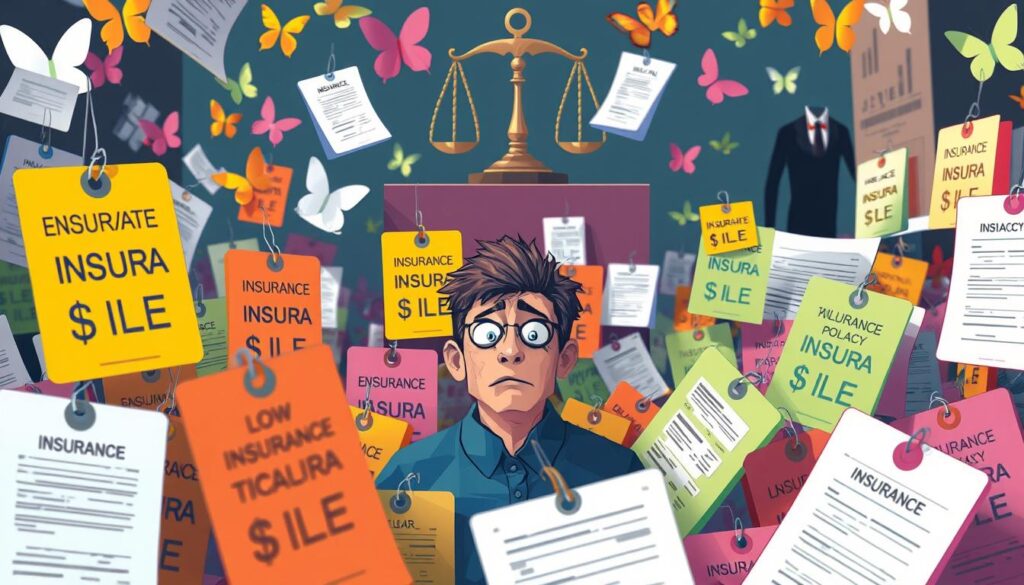Many people make mistakes when buying insurance. One big error is insuring a home for its real estate value, not the cost to rebuild. This can leave homeowners without enough coverage in disasters. It’s key to understand the need for enough coverage and to compare policies wisely.
Insurance mistakes can cost a lot. It’s important to make smart choices. Knowing common mistakes and how to avoid them helps ensure you’re protected. This means being careful and comparing policies to find the best one.
To avoid mistakes, think about the cost to rebuild, not just the home’s value. This way, you can get the right coverage. It helps protect you from unexpected losses and ensures you make good insurance choices.
Understanding the Real Cost of Insurance Buying Mistakes
Buying insurance requires careful decisions to avoid costly errors. Mistakes like underestimating coverage needs or misunderstanding policy terms can be very expensive. It’s also important to compare different quotes to find the best deal.
Not having enough coverage can lead to big financial problems. For example, rebuilding a home might cost more than its market value. This is why extended replacement cost coverage is crucial. It can cover up to 100% more than your policy’s Dwelling Coverage limit.
Not getting flood or earthquake coverage is another big mistake. It can leave homeowners facing huge financial losses.
Financial Impact of Inadequate Coverage
Not having enough coverage can cause serious financial issues. Without replacement cost coverage for belongings, you might only get a fraction of their value back. This is why it’s important to review your coverage every year.
By avoiding common mistakes, you can make better choices. This helps you avoid the long-term financial problems caused by poor insurance decisions.

Long-term Consequences of Poor Insurance Choices
Poor insurance choices can harm your financial health for a long time. Only having basic coverage can lead to big financial problems if accidents or damages happen. It’s key to choose based on the insurer’s reputation and coverage details, not just the lowest premium.
By making informed choices, you can protect your assets. This way, you avoid the financial pitfalls of bad insurance decisions.
Choosing Coverage Based Solely on Price
Many people focus too much on the cost of insurance, which can lead to insurance purchasing pitfalls. While cost matters, it’s also important to look at the insurance company’s financial health, customer service, and policy terms. This helps avoid insurance policy errors.
It’s key to find a balance to get the right coverage for you. Here are some important things to think about:
- Financial health of the insurance company
- Customer service and claims handling
- Policy terms and conditions
- Coverage options and limitations
Choosing coverage just for the price can have bad consequences. You might not have enough coverage, leaving you at risk of big financial losses if you need to make a claim. By looking at all aspects of insurance, you can make a better choice and avoid common insurance purchasing pitfalls.
It’s also smart to regularly check your insurance policy. This can help you spot risks and make changes if needed. You might need to update your policy to match your life changes or look for more coverage to stay protected.

Most Common Insurance Buying Mistakes to Watch Out For
When you buy insurance, knowing common mistakes is key. Avoid insurance buying errors by spotting frequent pitfalls. These include underestimating what you need, not understanding policy terms, and not comparing quotes.
Underestimating Coverage Needs
Many people underestimate their coverage needs. This can lead to not getting enough money if something goes wrong. For example, if your home is worth $300,000 but you only insure it for $50,000, you’ll only get $50,000 if it’s lost.
Misunderstanding Policy Terms
It’s important to know what your policy covers. Policy exclusions can surprise you if you don’t understand them. Most policies don’t cover everything, so make sure you know what’s not included.
To avoid common insurance mistakes, work with licensed agents. They can help you compare and understand different policies. By knowing what you’re getting, you can make smarter choices and steer clear of insurance buying mistakes.
- Underestimating coverage needs
- Misunderstanding policy terms
- Failing to compare multiple quotes
- Overlooking policy exclusions
Knowing these insurance buying mistakes helps you avoid them. This way, you can make sure you have enough coverage to protect your assets.
The Truth About Insurance Company Ratings and Reviews
When looking at insurance companies, it’s key to check insurance company ratings and insurance reviews. These give insights into a company’s financial health, customer service, and reputation. Studies show 90% of people don’t fully get their insurance policy. This makes it crucial to research and evaluate insurance companies well.
It’s important to know about the rating systems from agencies like AM Best, Standard & Poor’s, Moody’s, and Demotech. These agencies have different ways to rate insurance companies. For example, AM Best ratings go from A++ (Superior) to D (Poor). Standard & Poor’s ratings range from AAA (Extremely Strong) to D. Knowing these ratings helps you choose better.
- Financial stability and strength
- Customer service and support
- Claims handling and processing
- Policy options and coverage
- Insurance reviews from current and former customers
By looking at these factors and insurance company ratings and insurance reviews, you can make a better choice. You’ll find an insurance company that fits your needs and offers great service.
Smart Strategies for Policy Comparison
When comparing insurance policies, it’s key to have smart strategies. Look at different policies and think about what matters most to you. The deductible is important because a higher one can lower your costs but raise what you pay out-of-pocket if you make a claim.
Also, read the fine print of each policy. Look for any exclusions or limits. This helps you avoid surprises and make sure you’re covered right. By comparing and considering these details, you can choose the best policy for you.
Essential Coverage Checkpoints
When comparing policies, focus on a few key points. Look at the coverage level, deductibles, and premiums. Also, check out any extra features or benefits. Don’t forget to look at the insurance company’s reputation and customer service, and any discounts they offer. This way, you can find a policy that fits your needs and offers good protection.
Understanding Deductibles and Premiums
It’s vital to understand deductibles and premiums when comparing policies. A deductible is what you pay before your insurance starts covering you. Premiums are the regular payments for your coverage. By thinking about these, you can find a policy that’s affordable and offers the right protection. You might consider raising your deductible to lower your premiums or adding extra coverage, like flood insurance, for full protection.
By using these smart strategies and carefully looking at different policies, you can make the best choice for your needs. Whether it’s life, auto, or another type of insurance, taking the time to compare and consider your options can save you money and ensure you’re well-protected.
Critical Questions to Ask Your Insurance Agent
When you work with an insurance agent, it’s crucial to ask the right questions. This ensures you get the best coverage for your needs. You should talk about insurance policy specifics and what’s in your policy. A good agent can help figure out how much and what kind of insurance you need.
So, don’t hesitate to ask insurance agent questions to clear up any doubts.
Here are some key areas to discuss with your agent:
- Policy limits and deductibles
- Coverage options, such as roadside assistance and rental reimbursement
- Discounts available, including safe driver and multi-policy discounts
- Documentation requirements, such as proof of insurance and vehicle registration
By asking the right insurance agent questions and understanding your insurance policy specifics, you can make smart choices about your coverage. Always review your policy to make sure it still fits your needs. And don’t be shy to contact your agent if you have any questions or concerns.
Clear communication with your insurance agent is key to getting the right coverage. Don’t settle for just any policy. Take the time to discuss your insurance policy specifics and ask insurance agent questions to make sure you’re protected.
Making Informed Insurance Decisions: Your Action Plan Forward
Making smart insurance decisions is key to keeping your finances safe. By avoiding common mistakes and knowing the real costs of bad coverage, you can get the right insurance action plan.
Begin by checking your current policies and seeing if they meet your needs. Look at quotes from different companies. Don’t just focus on the price. Look at the policy details, what’s not covered, and the deductibles. A good insurance agent can help you understand everything and answer your questions.
Your insurance choices should match your life and future plans. By choosing wisely, you’ll feel secure knowing you’re protected against unexpected events.

